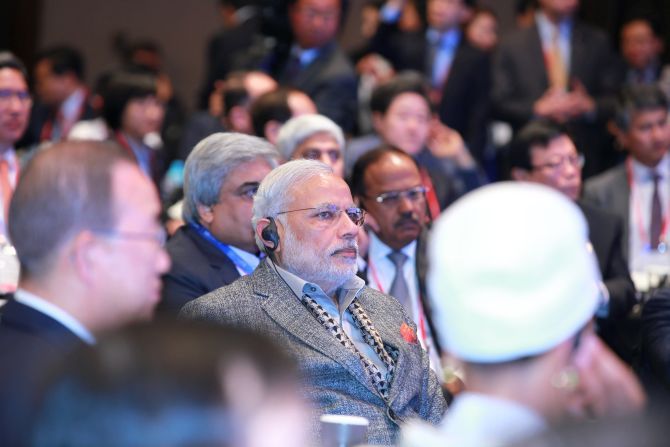'In economic matters governments should not take sides based on religion and caste,' says T C A Srinivasa-Raghavan.

There is nothing more satisfying than re-inventing the wheel.
Economists generally are particularly good at it, and Indian economists are even better.
If you don't believe me, just read the writings of pre-1947 Indian economists in J Krishnamurty's Towards Development Economics: Indian Contributions, 1900-1945. Your eyes will pop open.
Thus, several years ago, I was in Bangalore just after some Hindu-Muslim riots had happened in a district. A friend who is now a professor at the National Institute of Advanced Studies explained why.
Thanks to Congress policies in subsidising sericulture, which was dominated by Muslims, but not the rearing of silkworms -- which was dominated by Hindus -- the local economic balance between the Hindus and the Muslims had changed over a decade and half.
The Hindus were resentful of the new-found Muslim assertiveness arising partly from their relative prosperity.
This resentment had eventually contributed to the riots.
When I reminded my friend about this he wrote back saying 'a more general reason was effective decentralisation which saw the emergence of new leaders at the village level who challenged each other aggressively. This resulted in not just communal conflict but also aggressive caste conflict, and in some cases conflict between different factions of the same caste.'
Recently, I discovered that the same thing had been said way back in December 1930 by the venerable C N Vakil in a lecture at Elphinstone College, Jinnah presiding.
This was that in economic matters governments should not take sides based on religion and caste.
If it does, then the adversely affected communities will make their own compensating adjustments in their treatment of the beneficiary communities.
It is not known what Jinnah said in response. But since it was still 1930, he very likely endorsed Vakil.
The Congress, when it drew up the Constitution two decades later, ignored Vakil's warnings. It provided for reservations based on caste and tribes -- but not religion.
Now the birds are coming home to roost. Many more castes and also Muslims have begun demanding religion-based reservations.
Such targeted policies became more pronounced after Indira Gandhi became the dominant political force in 1971.
Taking the cue from her, several state governments have intervened at this micro level. They continue to do so, exacerbating both caste and communal conflict.
The idea of reservations, however, had not originated with the Congress.
It was the brainchild of the British who allowed job reservations in government based on caste and religion.
The jolly fellows they were, they had anticipated B P Mandal by 60 years.
If Vakil had pointed to a politically loaded aspect of the labour market, another much-ignored Indian economist, Rajani Kanta Das, pointed to the gender aspect of it.
Just after the Census of 1921 he wrote an amazingly forward-looking paper about female participation in the work force.
His main premise was 'the static and backward condition of India is in no mean extent due to the inferior position of her women.'
Using the latest Census data, his starting point was startling: As far as contribution to GNP was concerned, Indian women were contributing as much as their counterparts in other, more advanced countries.
So they had to be treated properly and made an integral part of the work force by treating them equally with men in every possible respect.
Das wanted free and compulsory education for women; appropriate working conditions for them, including creating a supply of accommodation for single women; abolition of purdah and caste taboos; and above all, full political empowerment.
Mind, he was writing all this in 1922 and 1923.
Did it happen? The answer depends on who you ask.
For example, where wages are concerned, the private sector linked wages to productivity and paid women less; the government and the public sector have de-linked it entirely from productivity, thus paying men less per any normal measure of productivity.
There was one thing missing in Das' paper though: Allowing women to work outside the home doubles the workforce, and therefore more or less halves the wage rate.
This problem continues to date.
There were many other issues those economists wrote about which still have relevance. Soon I will write about Radhakamal Mukherjee, who was the first economist in India to talk about why the Hindi belt is so appalling economically and what to do about it.
No one paid any attention to him, of course.











